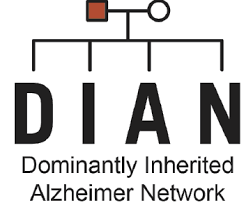DIAN
Dominantly Inherited Alzheimer Network (DIAN)

The Dominantly Inherited Alzheimer Network (DIAN) Observational Study enables researchers around the world to monitor and identify changes in individuals who carry one of the gene mutations (Presenilin1, Presenilin2 or APP) known to cause dominantly inherited Alzheimer’s disease (DIAD). There is currently no treatment that can prevent or delay the progression of AD, and no new treatments have been approved in over ten years. DIAN aims to define the natural history of AD and establish reliable biomarkers that track with disease.
Research suggests that brain changes may occur years before actual Alzheimer’s symptoms are detected. DIAN evaluates participants at entry and longitudinally thereafter with standardized clinical and cognitive testing, brain imaging, and biological fluid collection (blood, cerebrospinal fluid) with the goal of determining the sequence of changes in pre-symptomatic gene carriers who are destined to develop AD. Another goal is to establish a research database and tissue repository to support research by other investigators around the world. Knowledge gained from the Observational Study may lead to therapeutic options to detect and treat DIAD at its earliest stages — or prevent it all together.
For more information, please visit https://dian.wustl.edu/our-research/observational-study/
Principal Investigator

Project Contact

Clinical Research Coordinator
cdfitzpatrick@bwh.harvard.edu
617.643.0147